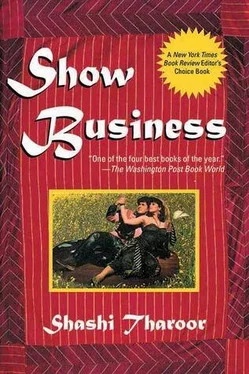“A counterrevolutionary?” I asked incredulously. “How?” He acquired this terribly intense expression, all beetle brows and outthrust jaw. “Because they serve, unconsciously or otherwise, to dissipate the revolutionary energies of the masses,” he replied. “The frustrations and aspirations that would fuel the masses’ struggle for justice is sidetracked by being focused on the screen success of a movie star. The proletariat’s natural urge to overthrow injustice is vicariously fulfilled in the hero’s defeat of the straw villain — me.” I swear the guy didn’t even smile. “Films in India are truly the opiate of the people; by providing an outlet to their pent-up urges, the Bombay films make them forget the injustice of the oppressive social order. Evil is personalized as the villain, rather than as the system that makes victims, not heroes, of us all. A false solution is found when the villain is vanquished, and the masses go home happy. The ownership and control of the means of production remain unchanged.”
Absurd, of course, but can you believe words like these coming out of the mouth of a Bollywood type? Especially this fellow, with his white shoes and ridiculous ties? And there was more, believe it or not. To make conversation more than anything else, I found myself saying something about the melting of class and caste barriers in Hindi movies, you know, along the lines of what I said to you just now about Mechanic. He objected quite strongly. “It is just the opposite. Romantic love across caste and class lines,” he declared solemnly, “is used to cast a veil over the classic contradictions inherent in these situations. It is an exploitative device to blur the reality of class struggle by promoting an illusion of class mobility. Instead of making the revolutionary youth want to overthrow the landlord, the Hindi film promises him he can marry the landlord’s daughter. The classless cuddle,” he concluded, “is capitalist camouflage.”
“You ought to enter politics yourself,” I suggested half jokingly, only to receive an earful about the bourgeois parliamentary system.
Speaking about the proletariat, though, you know we’ve kept them out of here. I’m afraid a combination of hospital rules, security considerations, and Maya’s preferences have left the great unwashed in the courtyard even as we troop into the intensive care unit for these measured monologues. I can’t imagine Cyrus Sponerwalla is any too happy about that, but then we haven’t let him in yet either. Anyway, what I wanted to tell you was that on my way in I spoke to one of the fellows waiting outside. He was, would you believe it, a rick-shawallah, condemned to a short and brutish life pulling human loads far too heavy for him through rough and pitted streets in rain and heat wave alike. He had spent all his savings to take a train from Calcutta to come and watch anxiously for your recovery. Somebody presented him to me and I stopped and talked, not just because I felt I had to, but because I was genuinely curious about what you meant to this man — a man who had, in effect, abandoned his livelihood to be by your bedside, or as close to it as he could get. Why did he like your pictures, I asked him.
He liked the action, he replied in Darbhanga-accented Hindi. Ashokji was a master of action, stunts, fights. He didn’t like pictures without action; if there is no action, he asked, what is there to see?
And this action, what did it represent for him?
The triumph of right over wrong, he said. The victory of dharma. The reassertion of the moral order of the universe. Ashokji was the upholder of Right: for this reason, he was like an avatar of God. The other avatars, Rama, Krishna, maybe even Buddha and Gandhi, are all worshiped, but they lived a long time ago and it was difficult to really identify with any of them. Ashok Banjara, though, lived today: his deeds could be seen on the silver screen for the price of a day’s earnings. And it was as if God had come down to earth to make himself visible to ordinary men. For me, sahib, he said, Ashokji is a god.
I left him, strangely humbled by the purity of his devotion to you, and trudged up the stairs into the hospital. I’m afraid I forgot to ask him his name.

Interior: Night
I can’t believe I'm doing this.
Me, Ashok Banjara, superstar of the silver screen, heartthrob of the misty-eyed masses, unchallenged hero of every scene in which I have been called upon to play a part, languishing in the back rows of the House of the People, the Lok Sabha, while cretinous netas in crumpled khadi, their eyes and their waistlines bulging, hold forth inarticulately on the irrelevant. But it is me, its my chin that’s resting on my despairingly cupped palm, it’s my elbow that’s weighing heavily on the polished wood of the parliamentary desk in front of me, it’s my lids that are drooping resignedly over my disbelieving eyes as I take in the spectacle of representative democracy in action and yawn. Ashok Banjara, parliamentary acolyte, ignored and condescended to by people who wouldn’t be cast as second villains in Bollywood: what is life coming to?
I thought they’d at least make me a minister. After all, not only was I better known and more widely recognized than everyone bar the Prime Minister, but I had, after all, conquered the dreaded Sugriva Sharma for them. I thought I’d get to pick my reward — “so what is it to be, Banjara-sahib, Foreign Affairs or Information and Broadcasting?” Perhaps, modestly discounting my extensive travels, I would pronounce myself insufficiently qualified to run the country’s external relations and graciously accept I and B instead, where I could take care of the film industry. I even had a humble speech planned, expressing gratitude for the opportunity to serve.
But none of it. When the Cabinet list was announced, I scoured it in vain for the most famous name in India. “What’s this?” I asked Maya in astonishment. “Where am I?” She thought that the jealous time-servers in the upper echelons of the party had prevailed upon the Prime Minister to name me as only a Minister of State or a deputy minister. “After all, Ashok, you are new to government.” I bridled at this, but she pointed out the names of other friends and allies of the PM (including a genuine political heavyweight) whom the chief also had felt obliged to relegate. So I waited.
But when the second tier of appointments to the Council of Ministers was announced, I did not figure among them either. And the Prime Minister wouldn’t return my calls. “I am leaving message, sir,” Subramanyam assured me. “Yevery time I am leaving message, but they are simply not phoning.” It is an unusual situation for him, and he is even unhappier than I am at this reversal of his standing.
“What did they bring me here for?” I asked Maya incredulously, “if they don’t want to give me anything to do?”
“I suppose,” she suggested ruminatively, “I suppose until they put you in the government, you should do what people in Parliament are supposed to do.”
“Make speeches?”
“You’re good at that, aren’t you?”
Well, there was no need to answer that. So here I am, immaculate in kurta-pajama of the purest white silk, the cynosure of most of the eyes in the visitors’ gallery. But down here in the well of the House they won’t let me get a word in. Whenever I raise my hand someone more senior is recognized ahead of me; by the time the queue thins, the debate is over. Whenever I raise my voice, I am shouted down. Half of the subjects discussed are obscure to the point of absurdity, and my flagging interest is not stirred by having to follow them through the speeches of a bunch of semieducated morons who would sound incomprehensible in any language. The other half of the subjects are hardly discussed at all: either they feature long ministerial monologues after which the party MPs are roused from their slumbers to vote dutifully for the government, or they degenerate into shouting matches with the stalwarts of the Opposition, who make up in volubility what they lack in numbers. Occasionally, both monologue and shouting match are punctuated by noisy walkouts by the other side, the Opposition protesting against a government bill it’s numerically powerless to overturn.
Читать дальше













